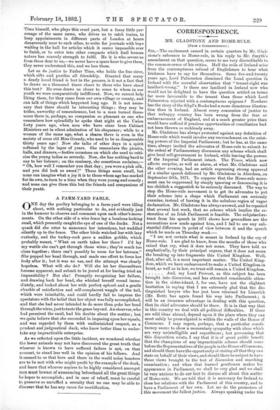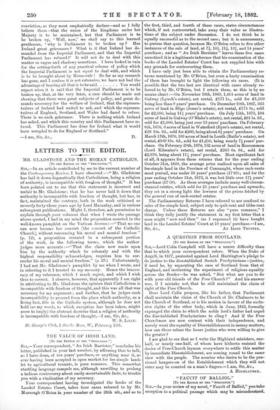CORRESPONDENCE.
MR. GLADSTONE AND HOME-RULE. Enron • CORRESPONDENT. j Sift,—The excitement caused in certain quarters by Mr. Glad- stone's reference to Home-rule, in his reply to Mr. Smyth's amendment on that question, seems to me very discreditable to the common-sense of his critics. Half the evils of Ireland arise from the contemptuous refusal of Englishmen to hear what Irishmen have to say for themselves. Some five-and-twenty years ago, Lord Palmorston dismissed the Land question in Ireland with the scornful observation that "tenant-right was landlord-wrong?' Is there one landlord in Ireland now who would not be delighted to have the question settled on terms far more favourable to the tenant than those which Lord Palmerston rejected with a contemptuous epigram ? Nowhere has the story of the Sibyl's Books had a more disastrous illustra- tion than in Ireland. Almost every concession of justice to that unhappy country has been wrung from the fear or embarrassment of England, and at a much greater price than would have sufficed if precious opportunities of conciliation had
not been thrown so recklessly away.
Mr. Gladstone has always protested against any definition of Home-rule which would involve any encroachment on the exist- ing powers of the Imperial Parliament; but he has, at the same time, always invited the advocates of Home-rule to submit to the ordeal ef Parliamentary discussion any scheme which shall give local self-government to Ireland, while leaving the powers of the Imperial Parliament intact. The Times, which now affects surprise, as well as alarm, at what Mr. Gladstone said the other evening, had an article expressing strong approval of a similar speech delivered by Mr. Gladstone in Aberdeen, on September 26th, 1871. To suppose that the Home-rule move- ment can be suppressed by simply ignoring or denouncing it is too childish a suggestion to be seriously discussed. The way to stop the Home-rule movement is to get its advocates to put their scheme into a shape which Parliament can seriously examine, instead of leaving it in the nebulous region of vague declamation. Mr. Gladstone has always avowed, and he repeated that avowal last week, that no scheme which implies the re- storation of an Irish Parliament is feasible. The subjoined ex-
tract from his speech in 1871 shows how groundless are the accusations now made against him, and I fail to see any sub- stantial difference in point of view between it and the speech which he made on Thursday week :— "I am not certain what is meant in Ireland by the cry of
Home-rule. I am glad to know, from the months of those who raised that cry, what it does not mean. They have told us emphatically, by their principal organs, that it does not mean the breaking up into fragments this United Kingdom. Well, that, after all, is a most important matter. The United King- dom, which we have endeavoured to make a United Kingdom in heart, as well as in law, we trust will remain a United Kingdom.
And, my Lord Provost, as this subject has been brought into discussion, and has attracted considerable atten- tion in the sister-island, I, for one, have not the slightest hesitation in saying that I am extremely glad that the dis- tinguished lawyer who has just been returned for Limerick (Mr. Butt) has again found his way into Parliament ; it will be an immense advantage in dealing with this question, that its chief advocates should be there. It is in that way that in this country we deal with all political difficulties. If there are wild ideas abroad, depend upon it the place where they can most safely be promulgated is within the walls of the House of Commons. I may regret, perhaps, that a particular consti- tuency seems to show a momentary sympathy with ideas which are very unintelligible and superfluous ; but presuming that this disposition exists, I say that it is of great public benefit that the champions of any impracticable scheme should come before the Representatives of the people in the House of Commons, and should there have the opportunity of stating all that they can state on behalf of their views, and should there be subject to have those views brought to the test of discussion and searching examination ; and when that learned gentleman makes his appearance in Parliament, we shall be very glad and we shall be very anxious to do our best to discuss all about this matter of Home-rule. We are told that it is necessary for Ireland to close her relations with the Parliament of this country, and to have a Parliament of her own. Let me do the promoters of this movement the fullest justice. Always speaking under the
conviction, as they most emphatically declare—and as I fully believe them—that the union of the kingdoms under her Majesty is to be maintained, but that Parliament is to be broken up, Well, now,' we shall say to this learned gentleman, why is Parliament to be broken up P Has Ireland great grievances ? What is it that Ireland has de- manded from the Imperial Parliament, and that the Imperial Parliament has refused ?' It will not do to deal with this matter in vague and shadowy assertions. I have looked in vain for the setting-forth of any practical scheme of policy which the Imperial Parliament is not equal to deal with, and which is to be brought about by Home-rule ! So far as my research has gone, and I confess it is not extensive, we have not had the advantage of hearing all that is to be said You would expect when it is said that the Imperial Parliament is to be broken up, that, at the very least, a case should be made out showing that there were great subjects of policy, and great de- mands necessary for the welfare of Ireland, that the represen- tatives of Ireland had united to ask, and which the represen- tatives of England, Scotland, and Wales had dared to refuse. There is no such grievance. There is nothing which Ireland has asked, and which this country and this Parliament have re- fused. This Parliament has done for Ireland what it would have scrupled to do for England or Scotland."



































 Previous page
Previous page